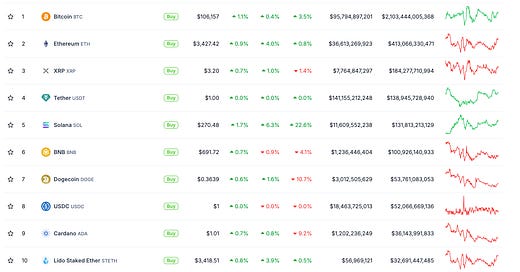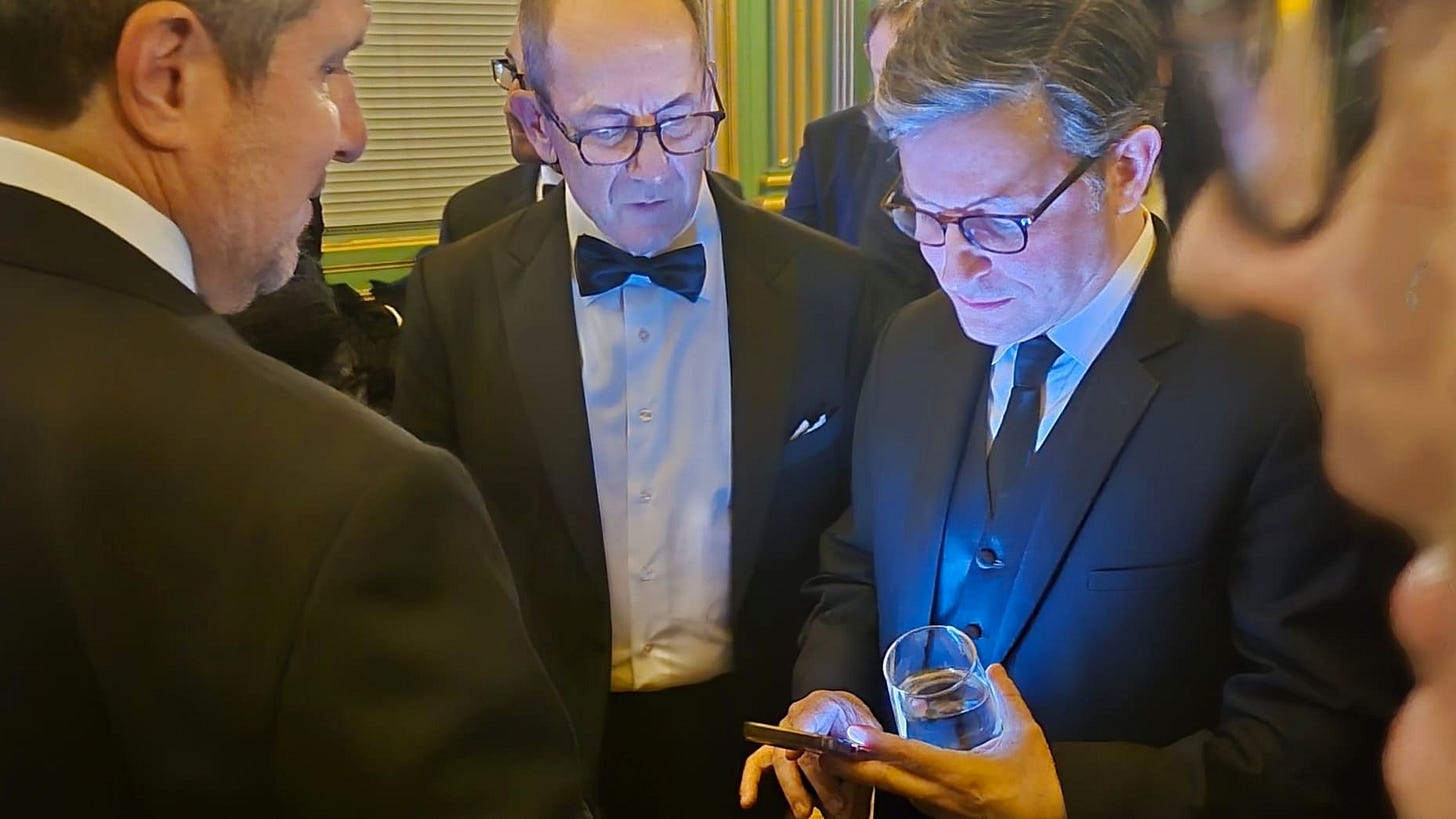The second era of Trumpism is upon us, and a few people have asked me about what this might mean for crypto.
Things are moving far too quickly for me to attempt a comprehensive analysis, but I would like to share some high-level thoughts on how a Trump administration might influence the evolution of cryptoeconomic systems like Bitcoin and Ethereum. For all of their issues, I believe they represent an important social and technological innovation that is here to stay.
Right now I’m tracking three distinct yet intertwined forms of influence — cultural, political, and economic.
Cultural
While many of the most influential figures in crypto — from entrepreneurs to policymakers — were busy celebrating Trump’s inauguration at a lavish Crypto Ball, Team Trump launched a brand new “memecoin” called TRUMP in the middle of the night. Memecoins are cryptoassets inspired by internet memes which are characterized by their highly volatile nature. The original and most famous example is Dogecoin.
The price of TRUMP skyrocketed from $4 to $30 overnight and reached a peak of $72.00 the following day. Several large fortunes were made by savvy speculators who managed to buy low and sell high. The next day, an official MELANIA coin was launched and eager traders who felt they missed the boat on TRUMP piled in. Demand for both tokens was so high that it overwhelmed the Solana blockchain network that was used to launch both projects.
Trump’s foray into the world of memecoins will contribute to their continued use as a popular tool for content creators and celebrities to capitalize on their name recognition and brands. However, these tokens are a distraction from the bigger picture.
Donald, Donald Jr., Eric, and Barron Trump have launched a new organization called World Liberty Financial along with a slew of technically competent crypto veterans. They’ve raised hundreds of millions of dollars to build a polished, user-friendly interface that will introduce decentralized borrowing and lending to a broader mainstream audience. This is one of crypto’s most powerful and popular use cases beyond speculation.
The organization is gradually accumulating a massive crypto treasury (currently sitting at ~$382,000,000) worth of Ether, Bitcoin, and assorted other cryptoassets. All of their financial activity on the blockchain can be easily tracked in real-time.
Projects like this focused on genuine use-cases beyond pure speculation are what will allow Trumpism to help accelerate the normalization of crypto as a cultural phenomenon.
Political
The Trump administration is being stacked with pro-crypto figures.
The new acting chairman of the Securities and Exchange Commission (SEC), Mark Uyeda, has declared in the past that the War on Crypto must end.
Uyeda has appointed a fierce crypto advocate, SEC commissioner Hester Peirce to lead a new crypto task force that will be focused on “developing a comprehensive and clear regulatory framework for crypto assets.”
Caroline Pham, the new acting chair of the Commodities and Futures Trading Commission (CFTC), has argued that the U.S. should develop a regulatory sandbox to facilitate innovation and sensible regulations for crypto.
Former Paypal Chief Operating Officer David Sacks has been appointed AI and Crypto Czar.
This new lineup of public officials will lead a complete reversal in approach from the one embraced by outgoing SEC chairman Gary Gensler, whose reign was characterized by a policy of arbitrary “regulation by enforcement” and a stubborn refusal to articulate clear rules for crypto investors and entrepreneurs to follow. Just last week a Federal Judge ordered Gensler’s SEC to explain its decision to not provide clear rules for crypto and warned them against providing “yet another poor explanation in an already-long line of them.”
The administration’s efforts will be supported by a Congress filled with crypto advocates on both sides of the aisle. Most notably is Senator Cynthia Lummis (R) who now chairs the brand new Senate Banking Subcommittee on Digital Assets, and has introduced legislation calling for the United States to create a Strategic Bitcoin Reserve.
She will be joined by the likes of senators Kirsten Gillibrand (D), and Ted Cruz (R) along with representatives Ro Khanna (D), Tom Emmer (R) and Ritchie Torres (D) who have all fought hard and in bi-partisan fashion to support the creation of clear and fair rules for the crypto industry.
Yesterday Trump proclaimed that the U.S. will become the “world capital for AI and crypto.” He then signed an executive order outlining an ambitious and comprehensive plan that will, in the words of Electric Capital co-founder Avichal Garg, “protect individual freedoms, ensure financial sovereignty, and reassert U.S. dominance in the global digital economy.”
Some of the major remaining open questions include:
Do the rumors of complete elimination of capital gains taxes on all or certain classes of cryptoassets have any merit, and are they politically achievable?
Will the U.S. actually adopt a strategic Bitcoin reserve and start directly purchasing bitcoin? The “stockpile” mentioned in Trump’s executive order is a small step in that direction.
Will any of the individual states pass legislation that has been introduced to adopt strategic bitcoin reserves?
A yes to any of these would lead to major changes in the political structure which exerts significant influence on the supply and demand dynamics of the cryptoeconomy.
Economic
For many people, the main question around crypto is still “can/how will this stuff get me rich?”
I’m not going to give any financial advice, but I will make general comments on how I expect market structure and dynamics to change.
A brief glance at headlines from the past week illustrates how major financial executives are changing their tune on crypto with the arrival of a new administration.
A few days ago Bank of America’s CEO said that “the banking system will come in hard on the transactional side of [crypto],” if regulators create clear rules.
BlackRock CEO Larry Fink is calling for the SEC to allow for the “tokenization” (ie: blockchainification) of bonds and stocks, proclaiming that "if we can tokenize bonds and stocks...it will democratize investing in ways we can't imagine."
Morgan Stanley’s CEO, Ted Pick, has said that “the bank will work with U.S. regulators on offering crypto.”
As institutional support for various cryptoassets accelerates, it will create more demand to the tune of hundreds of millions if not billions of dollars pouring into the burgeoning cryptoeconomy over the next few years. We will see unprecedented levels of chaotic and casino-like behavior along with outright scams as bubble-fueled mania sets in.
There will be new all-time highs that create fortunes, and there will be massive crashes that ruin people’s lives.
But most importantly, the environment will become much more favorable for legitimate crypto entrepreneurs building products that leverage the unique aspects of public blockchains to deliver real value to consumers.
End Game?
Crypto, like the world wide web, was brought to life by dreamers and visionaries who have been forced to face some harsh truths about reality.
Crypto-lawyer Gabriel Shapiro put it perfectly.
'“Ironically just at the point of finally being 'legalized' and going mainstream, the industry feels like it's succumbed almost completely to unsustainable zero-sum financial nihilism and bloodthirsty competition instead of taking the opportunity to build toward cypherpunk ideals or really any other ideals than Moloch/Mammon/getting rich.
In other words--Wake the fuck up and *really* believe in something, some mission to try to make the world really better, before it's too late, or crypto will die or turn into something even more sinister than what it was trying to replace.
I'm still gonna be here trying to break through with something.”
As an early adopter, I was forced to abandon my idealistic hopes long ago. Yet I still remain optimistic that creative individuals and groups with good hearts and wisdom gained through experience will find opportunities to use cryptoeconomic systems in ways that benefit humanity.
Note: None of this is financial advice, and I do hold cryptoassets.








I enjoyed this! Very illuminating. Larry fink wanting to tokenize stocks is insane, would’ve never expected him to say that